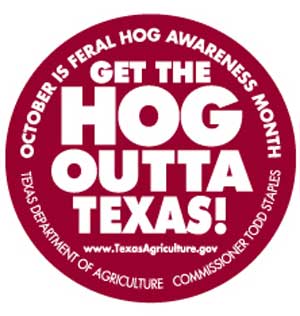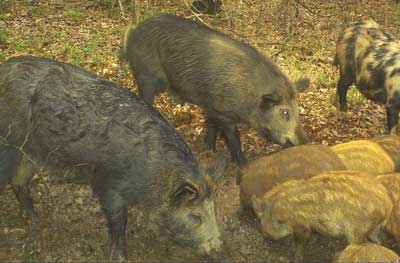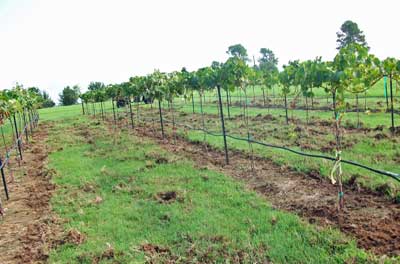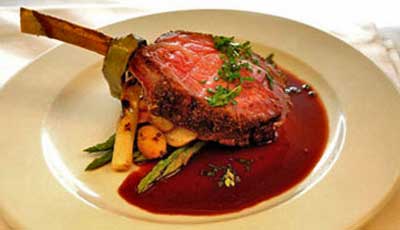
Get the Hog Outta Texas: Drink More Texas Wine, Help Rural Texas
We have a hog problem in Texas and we need your help to win the battle! Rally with us this Saturday, Oct. 9, at the Texas Department of Agriculture’s “Get the Hog Outta Texas!” tailgating event at Cowboys Stadium in Arlington to defeat the Arkansas Razorbacks and feral hogs.
Not only will we support our Aggie football team, we will also raise the awareness of the impact of feral hogs to urban and rural Texans alike. This event is made possible by generous donations and we appreciate the donations from Black-eyed Pea, Monarch Hunting Products, Frito Lay and HeloTech Aviation. Come enjoy tasty food and beverages and pick up your “Hog Out” stickers, cups and towels.
Most people around the Texas wine industry know that I will cook nearly anything that they can hunt or legally kill and that I will find an interesting wine pairing for it, too. I’ve made an authentic Coq au Vin from gulf coast wine grower Louise Rice’s rooster after he pecked at her ankle one time too many. A friend in the Texas hill country yielded several dinners of delight by providing me a selection of rabbit, wild boar and deer that crossed his gun sight.
I have to admit that I’ve experienced Texas feral hogs from a few different perspectives. I received an adult feral hog from an unnamed source that, even after 24 hours of smoking, [and even subsequent braising] wasn’t palatable, or even chewable, and ended up in the trash. But, I also received a small feral pig that was dispatched at Fall Creek Vineyards. When smoked, it was truly a tasty treat and paired well with a luscious red – Fall Creek Meritus. My assembled dinner guests toasted the Auler’s for donating the young feral hog and for making such a great wine.
Most recently, feral hogs invaded my property in Alamo Springs Ranch near Fredericksburg. They’ve rooted up plants, not once or twice, but on multiple occasions. I’ve noticed that they must be causing problems for others on the ranch, as well. This summer, I saw a large feral hog-sized cage on a truck heading for the back of the ranch.

Statistics from the Texas Department of Agriculture indicate that feral hogs cause more than $400 million in damage each year to rural and urban properties in Texas.
I recently asked Texas wine growers their thoughts about feral hogs – Damage to Texas vineyards, how to hunt, and to-eat or not-to-eat, that is the question.
Renee Baker a grower in Chandler, Texas said, “We need to raise awareness of the havoc that feral hogs wreak on both wine growers and all rural landowners. I have plenty of photos of hogs (dead & alive) and the damage they have done to our vineyard, but no recipes to offer. We hate ’em so much that we can only shoot them…not eat them! I’ve heard of folks digging a pit and doing the old fashioned BBQ thing. I would say, go for the Texas pigs if you want some pulled pork and try it with a spicy red wine with pork BBQ and all the trimmings!

Another grape grower, Bob Cham said, “In my little town in Lazio, cinghiale (wild boar) is a delicacy. You don’t have to like them to eat them, and a big Texas red would go very well with it. It is best if simmered long with spices and served with grilled polenta (grits).”
Les Constable at Brushy Creek Vineyards said, “My uncle in Florida has trapped and fed his church with wild hogs for many years. He first traps the hogs alive and puts them in a pen near his home where he feeds them corn for several months. Then, he cuts up the hog into very large chunks that are dry rubbed with sausage seasoning then wrapped in several layers of Aluminum foil. He cooks it on a grill until well done, turning over often. The meat is fall-off-the-bone tender and with great flavor.”
Tiberia at Barking Rocks Winery said it short, sweet and to the point, “Kill em young, leave em on the bone, sear em well, wrap em tight, cook em slow, and pair with older soft oaky reds. This is not a joke. Hope you,re well.”
Long time Texas grower, Neal Newsom at Newsom Vineyards in Plains, Texas, summed up irradicating feral pigs the high plains way with a helicopter and a rider with a shotgun with double 0-0 shot. He said, “We can get 200 to 300 per day that way. That’s what we do on the High Plains. We don’t eat them, though. They don’t deserve that much respect. But, then we open a big Texas Red and celebrate!

Chef and cook book author Terry Thompson-Anderson said, “Wow – wild hog and Texas wine – one of my favorite pairings. I’m particularly partial to the meaty little racks. Remove as much of the natural fat as possible as it is particularly lanolin-tasting. Cover the rack with pork fatback or strips of bacon to keep them moist. It is a good idea to brine them for about 12 hours before smoking – helps with moistness, flavor, and tenderness [See Chef Terry’s brine and rub recipes are given below]. I like to smoke them over hardwood fire as I find that the smoke helps to tame the game flavor a bit. I use a rub/olive oil mixture to pre-baste the meat, then baste often during cooking. About 2 hours at 275 degree internal pit temperature. To serve I make a dried chili-based (ancho or pasilla de Oaxaca) sauce, glazing the racks with it when they come off the pit, then passing more at the table. I really enjoy McPherson Cellars or Alamosa Wine Cellars Sangiovese with the racks, or Becker Zinfandel.”
As you can see, in Texas wine country, the jury may still be out on to-eat or not-to-eat. But it seems likely that, fewer feral hogs and more Texas wine consumed in the state are both good things for rural Texas.
Seriously Looking for a Solution to the Feral Hog Problem in Texas
Seriously, in an effort to decrease damage and reduce the state’s population of nearly 2 million feral hogs, TDA is sponsoring a statewide competition that will be judged on a county’s efforts for hog removal, hog abatement education and volunteering acres for eradication efforts. TDA will award the three leading Texas counties a total of $50,000 in grants to be used for further feral hog management. For more information on the challenge please check out www.TexasAgriculture.gov.
Look for the GO TEXAN tents and “Get the Hog Outta Texas!” signs in Lot 10 of Cowboys Stadium between 11 a.m. and 2:30 p.m., Saturday, Oct. 9, to support the Aggies and help tackle Texas’ ongoing and costly feral hog problem.
Remember: Get the Hog Outta Texas, Drink More Texas Wine and Help Rural Texas….
— — — — —
Chef Terry Thompson-Anderson’s Brine and Rub for Pork Roast or Chops
Makes about 4-1/2 quarts.
Brine:
1 gallon water, divided
1 cup kosher salt
4 bay leaves
1 tablespoon whole coriander seeds, toasted
1 tablespoon whole black peppercorns
½ cup fresh thyme sprigs
1 cup brown sugar
2 oranges, quartered
1 large white onion, cut into thick slices
4 garlic cloves, crushed
Rub:
¼ cup brown sugar
2 teaspoons kosher salt
1 tablespoon ground black pepper
1 tablespoon paprika
½ teaspoon smoked paprika
1 tablespoon chili powder
1 tablespoon coriander seeds, toasted and ground
To make the brine, bring 4 cups of the water to a simmer in a large deep pot. Add the salt, bay leaves, coriander seeds, black peppercorns, thyme, and brown sugar. Whisk and simmer for 2 minutes, or until the salt has dissolved.
Add the oranges, onion, and garlic. Simmer, covered, for 10 minutes. Remove from heat stir in the remaining 3 quarts of water. Chill before adding pork roast or chops. Brine for 24 hours.
To make the rub, mix all ingredients together in a small bowl, tossing with a fork or small whisk to blend thoroughly and evenly. Store, covered. To use, coat all surfaces of pork roast or chops with the rub before roasting or grilling.

I have dogs that i can catch hogs with…when u run hogs with dogs they will move out plus counting the ones we catch please let me know if i can bring my dogs
Colby,
Thanks for the offer. I think the best way to offer your services is to contact the wineries/vineyards directly. I know that some already hunt the wild hogs that occupy their vineyards. I have cooked several of them and 80 percent have been really fine eating. You might contact the Texas Wine and Grape Growers Association (See: http://www.twgga.org).
Russ